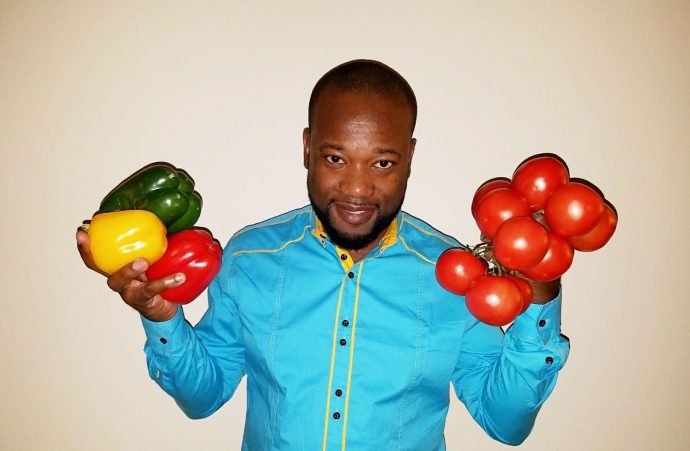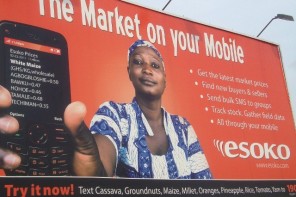Meet Roland Fomundam, the founder & CEO of GreenHouse Ventures. This devoted social entrepreneur is dedicated to developing technical entrepreneurial ideas or businesses that, serve vulnerable groups within the society. In the last 7 years, he has established 3 major companies in a bid to develop young potentials and make agriculture a profitable investment once again. We caught up with Mr. Fomundam to tell us more about his inspiring adventures.
I.A.M: GreenHouse Ventures is quite popular within the agricultural sector in Cameroon. What is its mission and objective?
The greenhouse technology has proven to increase productivity and hence profitability in agriculture. Our mission is to improve on the quantity and quality of products for farmers and consumers while saving the environment using the affordable greenhouse technology. We focus on the three main elements of sustainability, which include: the People, the Plant and the Planet. By so doing, we can portray agriculture as an enjoyable, profitable and sustainable activity that also saves our environment. This defies the generational stereotype that, agriculture is for the rural poor, the dirty and uneducated people.
I.A.M: Your company seeks to provide innovative solutions to problems in agriculture particularly within the African context. What were some of the problems you identified?
Farmers produce but don’t consume due to poor post-harvest loss management. Land resources are less utilized and/or sold at a pittance due to economic hardship. The general population especially youths face acute unemployment opportunities and agriculture has a potential to provide employment opportunities if/when the right investments are made in it. The effects of rural – urban migration continues to create voids which hamper the socioeconomic standards of the citizens. Agriculture productivity is on decline with the increased use of chemicals that have an adverse effect on the lands, the products and the consumers. Greenhouse Ventures seeks to provide solutions to these problems in a manner that will increase production and maximise profits for farmers and high valued food at affordable prices to consumers.
I.A.M: The GreenHouse technology is an underlying aspect in your project. What exactly are its benefits?
Firstly, greenhouse agriculture is the easiest form of agriculture. I mean, you go in clean and come out clean. As opposed to the expensive glass Greenhouses with temperature regulating installations, we came up with an affordable Greenhouse technology that is made from a very special type of plastic built with fungi repellent properties. Our design uses local materials and it last for over 10 years. Unfortunately, we must import this plastic for now. However, we believe that with the introduction of this plastic we can also introduce its production in country. The greenhouse cultivation has proven to be more efficient and effective as compared to outdoor agriculture. Through our locally adapted drip irrigation system, fertigation and solarisation techniques which we have incorporated in our greenhouse project, it is very effective to maximise water use by reducing water waste to over 85% and the crops grow faster and healthier. Most importantly, the crops are grown naturally and have very good quality. The scale of production is about 10 times more compared to outdoor production. We can grow crops throughout the year without any effects from the external environment. That means, we can have 4 harvests as opposed to only 2 harvests a year.
I.A.M: How accessible is the Greenhouse technology?
We pride ourselves as the only company in the world with the business model that seeks to engage the general population in the ownership, utilization, production and management of the greenhouse technology through various means. We have tested different designs and successfully adapted our technology to the varying climatic conditions throughout Cameroon. We have established the Greenhouses in 4 regions and should have a presence in all regions by the end of 2018. We have standardized out operations, developed learning methods and manuals and carried out a nationwide sensitization campaign to educate the population of the technology and its benefits. We continue to forge collaborations with private and public sector to foster the reach and penetration of our technology in several communities.
Discover more Agricultural Stories here
I.A.M: Is there a business model peculiar to GreenHouse Venture? If so, how does it work?
We have introduced three different models to the greenhouse technology. First, we introduced the partnership model, wherein people can partner with us and share the cost of start-up and profits. That way the cost and the risks involved are shared and minimized. This model has been very attractive to a lot of people. Secondly, you have the franchise model. It is very similar to a partnership but lasts for a limited period of time (3 to 5 years). However, we maintain the aspect of buying the products after harvest even after the partnership period. By so doing, we can always assure our clients a market. Thirdly, the exclusivity model allows clients to buy and own greenhouses out rightly. We equally train these clients in the art of greenhouse cultivation.
I.A.M: How would you describe your beneficiaries in terms of age, gender and interests?
We target the youths because we believe that, this is the only way we can engage them in agriculture. Both boys and girls are involved in it. Everybody working with me is as young as me or younger than myself (35 and below). We have been looking at different ways to attract this group. Thus far, we have greenhouses at the University of Buea, the University of Dschang, the Bamenda University of Science and Technology and the Hortifloral Institute in Buea. Our works in these areas make it very attractive to the students. Some youths are in discussion with their parents in an effort to acquire a piece of land so they can get involved with us. We are also working with some municipalities to get land that could be leased to youths for the purpose of greenhouse cultivation. Dozens of people in the rural areas have been very attracted to our models because they have excess land available. Several people in the diaspora equally reach out to invest in it and encourage their siblings or relatives to be involved. Through a partnership with a US based organisation called Colour of Roses Foundation, we have built a greenhouse at an orphanage in Bambui, Cameroon called Helping Hands Children’s Home as part of our One Greenhouse One Orphanage project. They consume some products and the excesses are marketed. The profit will be used to improve on the socio-economic lives of the orphans. We also provided the technology to the Muslim community in Mbengwi when the threat was a high in the country, to divert the young peoples’ attention by engaging them in an income earning potential project. We continue to identify target groups to make such tangible contributions through the GreenHouse Foundation.
I.A.M: Environmental protection and management. What does that mean to GreenHouse Ventures?
This technology contains greenhouse gases such as carbon dioxide. The greenhouse technology is used as an efficient tool to mitigate the global warming crisis because it contains the greenhouses gases – feeds them to plants and reduces the carbon footprint in respective places.
I.A.M: Let’s talk entrepreneurship. What challenges have you encountered so far? How do you overcome them?
My journey of entrepreneurship has been an interesting one. It saddens me to say we do not have a profound support platform. That is the main challenge. Young entrepreneurs have more external support than internal support. Under such circumstances I have been attracted to other countries than Cameroon where my technology is most needed. Entrepreneurship is taught at numerous universities but unemployment is still on the rise. Nonetheless, entrepreneurs find opportunities in every crisis-situation. We thrive better when we are being challenged.
Also discover how Western Union is fostering Agriculture in Africa
I.A.M: What do you think can be done to ignite the spirit of entrepreneurship in Cameroonians?
A platform to scaffold ideas, and turn them into viable projects with incentives to promote business establishment, growth and scale will certainly have a measurable impact to the economy as a whole. Business plan competitions, business incubators and hands on learning will ignite and foster creativity. Entrepreneurship courses should be accompanied by real experiences to prepare students for real life successes. A system of mentor and mentees will also go a long way to build long lasting successes.
I.A.M: What should we look out for at GreenHouse Ventures?
Our ultimate goal is to become the leader in sustainable agriculture in West and Central Africa. We have designed our greenhouses for every ecological zone; we have mastered the art of growing over 50 different crops; we have courses to train any individual irrespective of their educational background and we are establishing a farmers’ cooperative platform to engage multiple growers to gain growing resources and access to markets for their harvests. In three years from now we plan to set up a processing factory for tomatoes and other fruits in Cameroon. We have a lot of prospects in Chad, Nigeria, Gabon, and Uganda and in the Central African Republic where we are working with local entrepreneurs who have access to other resources. We are working with Universities and other learning centres to introduce new and simple technology ideas to make agriculture more enjoyable.
GreenHouse Ventures is rewriting the story of agriculture, hoping to significantly impact the African economy with it eco-friendly technology. If you thought agriculture was a poor man’s job, you may want to reconsider that thought.





